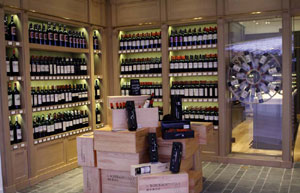|
 |
|
 |
"Traditionally, people in China have looked to wine to give a sense of status. It's all about projecting this image," says Jim Boyce, author of Beijing-based wine blog, Grape Wall of China.
He says this has changed with government measures to deter lavish gifts.
"In the past decade, taste has been a minor reason for people buying wine in China.
"Now sellers have to find customers who actually want their wine because they like it. I think we're moving into an era when consumers have a lot more power.
"By bringing the drinkers forward it's creating a healthier market. It's creating a market where people will buy wine based on taste and value rather than price, a famous name or because the buyer has a big budget to spend."
The gradual move away from premium wines with a well-established name has opened doors for smaller foreign wine producers, who are willing to cater to changing Chinese tastes.
Despite sluggish sales for China's mid-level wines, Helene Le Ponty moved to Beijing from her small village in Bordeaux hoping to find a niche for her family's wines.
Opening Le Ponty Wine's first international office in Beijing in 2012, the fourth-generation owner of the 105-year-old Fronsac-based chateau says she wants to avoid traditional distribution channels to market directly to China's wine drinkers.
"When I first arrived here, everyone was telling me that there wouldn't be a market for my wine. They said you have to be either very cheap or very expensive," she says. "I thought to myself there is an interest in mid-level wines. People are just over-pricing them."
With low-end wines starting at 100 yuan and the higher-end going for up to 1,200 yuan, Le Ponty has so far found high demand for her wines. Last year she sold roughly 24,000 bottles in China, 33 percent of the 72,000 bottles Le Ponty Chateau produces every year.
Pushing to make her product more identifiable to Chinese drinkers, the chateau has translated the names of its wines on offer in China, transforming French names such as Grand Renouil, the name of the river near Le Ponty's vineyard, into Mandarin-friendly Ge Hua Lu, roughly translated as "a heavenly drink".
Le Ponty says for a small brand, targeting a specific city, rather than trying to go national immediately, has been the foundation of her success.
"The problem with China is that to be a national brand is almost impossible because of cost. Only a few brands can do it. To be a local brand, even in the city of Beijing with 20 million people, if you're a small winery you just cannot serve the city," she says. "This is such a large country and you only need a small slice of people to care about your brand to make it viable."
|
 |
 |
